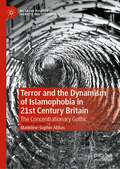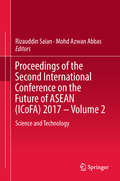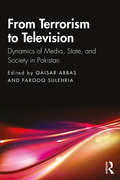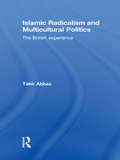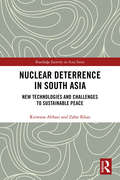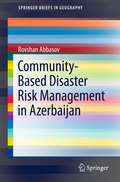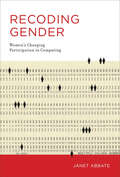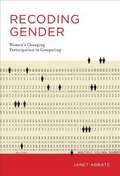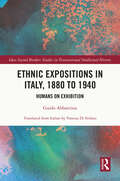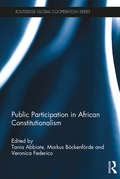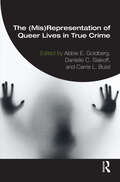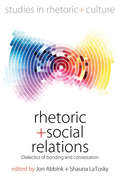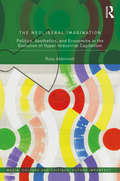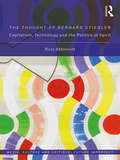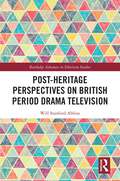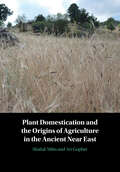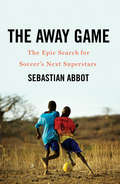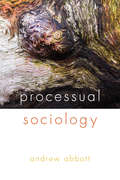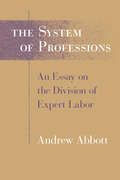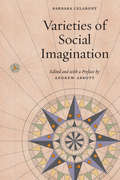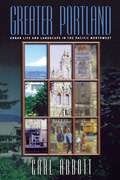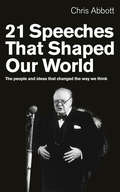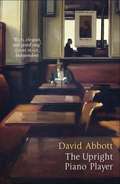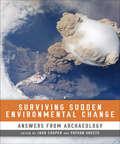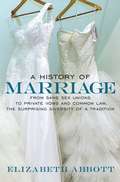- Table View
- List View
Terror and the Dynamism of Islamophobia in 21st Century Britain: The Concentrationary Gothic (Palgrave Politics of Identity and Citizenship Series)
by Madeline-Sophie AbbasThis book provides powerful insights into the dynamics, nature, and experiences of the terrors of counter-terrorism measures in the UK. Abbas links her analysis to wider concerns of nation construction and belonging; racial profiling and policing; the state of exception and pre-emptive counter-terrorism measures; community-based counter-terrorism measures; and restrictions to political engagement, freedom of speech and hate speech. What makes this work distinct is its advancement of an original framework - the Concentrationary Gothic - to delineate the racialised mechanisms of terror involved in the governance of Muslim populations in the ‘war on terror’ context. The book illuminates the various ways in which Muslims in Britain experience terror through racialised surveillance and policing strategies operating at state, group (inter- and intra-), and individual levels in diverse contexts such as the street, workplace, public transport and the home. Abbas situates these experiences within wider racial politics and theory, drawing connections to anti-Semitism, anti-blackness, anti-Irishness and whiteness, to provide a complex mapping of the ways in which racial terror has operated in both historical and contemporary contexts of colonialism, slavery, and the camp, and offering a unique point of analysis through the use of Gothic tropes of haunting, monstrosity and abjection. This vital work will be of interest to students and scholars across sociology, criminology, anthropology, terrorism studies, Islamic studies, and critical Muslim studies, researching race and racialisation, security, immigration, nationhood and citizenship.
Proceedings of the Second International Conference on the Future of ASEAN (ICoFA) 2017 – Volume 2: Science And Technology
by Mohd Azwan Abbas Rizauddin SaianThis book examines how business, the social sciences, science and technology will impact the future of ASEAN. Following the ASEAN VISION 2020, it analyses the issues faced by ASEAN countries, which are diverse, while also positioning ASEAN as a competitive entity through partnerships. On the 30th anniversary of ASEAN, all ASEAN leaders agreed to the establishment of the ASEAN VISION 2020, which delineates the formation of a peaceful, stable and dynamically developed region while maintaining a community of caring societies in Malaysia, Indonesia, Singapore, Brunei, Vietnam, Thailand, the Philippines, Myanmar, Laos and Cambodia. In keeping with this aspiration, Universiti Teknologi MARA Perlis took the initial steps to organise conferences and activities that highlight the role of the ASEAN region. The Second International Conference on the Future of ASEAN (ICoFA) 2017 was organised by the Office of Academic Affairs, Universiti Teknologi MARA Perlis, to promote more comprehensive integration among ASEAN members. This book, divided into two volumes, offers a useful guide for all those engaged in research on business, the social sciences, science and technology. It will also benefit researchers worldwide who want to gain more knowledge about ASEAN countries
From Terrorism to Television: Dynamics of Media, State, and Society in Pakistan
by Qaisar AbbasThis book unpacks the media dynamics within the socio-cultural, political, and economic context of Pakistan. It provides an in-depth, critical, and scholarly discussion of contemporary issues such as media, state, and democracy in Pakistan; freedom of expression in Pakistani journalism; Balochistan as a blind spot in mainstream newspapers; media control by state institutions; women and media discourses; TV talk shows and coverage of Kashmir; feminist narrative and media images of Malala Yousufzai and Mukhtaran Mai; jihad on screen; and Osama bin Laden’s death on screen, to understand the relation between media and terrorism. The book covers diverse media types including TV, radio, newspapers, print media, films, documentary, stage performance, and social media. Detailed, interdisciplinary, analytical, and with original perspectives from journalists as well as academics, this volume will be useful to scholars and researchers of media studies, Pakistan studies, politics and international affairs, military and terrorism studies, journalism and communication studies, and South Asian studies. It will also interest general readers, policy makers, and those interested in global journalism, mass media, and freedom of expression.
Islamic Radicalism and Multicultural Politics: The British Experience
by Tahir AbbasThe expression of an Islamic political radicalism in Britain has been one of the most dramatic developments in recent decades. Islamic Radicalism and Multicultural Politics explores the nature of this phenomenon by analysing the origins of Islam and its historical contact with Western Europe and Britain, and the emergence of Islamic political radicalism in the Muslim world and in the West. Tahir Abbas draws on historical analysis and contemporary case studies to explore the post-war immigration and integration of Muslim groups, the complex relations that exist between a secular liberal Britain and a diverse but multifaceted Islam, and the extent of social and economic inequalities that affect Muslims as individual citizens and in local area communities. He shows how violent extremism among British Muslims is in reality influenced by a range of issues, including the factors of globalisation and contemporary politics, media and culture. Analysing and dissecting public policy, Abbas offers suggestions for tackling the major social, political and economic questions facing British Muslims in the post-7/7 era. An important contribution to the study of religion, ‘race’ and ethnicity in modern Britain, this accessible work will be of interest to anyone working in the field of Islamic studies, sociology and political radicalism. Cover design by Mahtab Hussain, www.mahtabhussain.com
Nuclear Deterrence in South Asia: New Technologies and Challenges to Sustainable Peace (Routledge Security in Asia Series)
by Rizwana Abbasi Zafar KhanThis book explores evolving patterns of nuclear deterrence, the impact of new technologies, and changing deterrent force postures in the South Asian region to assess future challenges for sustainable peace and stability. Under the core principles of the security dilemma, this book analyzes the prevailing security environment in South Asia and offers unilateral, bilateral, and multilateral frameworks to stabilize peace and ensure deterrence stability in the South Asian region. Moreover, contending patterns of deterrence dynamics in the South Asian region are further elaborated as becoming inextricably interlinked with the broader security dynamics of the Asia-Pacific region and the interactions with the United States and China’s Belt and Road Initiative. As India and Pakistan are increasingly becoming part of the competing strategies exercised by the United States and China, the authors analyze how strategic uncertainty and fear faced by these rival states cause the introduction of new technologies which could gradually drift these competing states into more serious crises and military conflicts. Presenting innovative solutions to emerging South Asian challenges and offering new security mechanisms for sustainable peace and stability, this book will be of interest to academics and policymakers working on Asian Security studies, Nuclear Strategy, and International Relations.
Community-Based Disaster Risk Management in Azerbaijan (SpringerBriefs in Geography)
by Rovshan AbbasovThis book illustrates the main factors of vulnerability and gives a clear picture about the possible interventions to reduce disaster risks both in schools and communities in Azerbaijan. A new methodology for child centered vulnerability assessments both on school and community levels has been developed. This methodology can be used to assess the level of vulnerability of schools and communities. The book is a newly prepared training manual which will help practitioners conduct trainings for government and community organizations. While the book is focused on a specific region, the suggested approach is generic and can be used elsewhere.
Recoding Gender: Women's Changing Participation in Computing (History of Computing)
by Janet AbbateThe untold history of women and computing: how pioneering women succeeded in a field shaped by gender biases.Today, women earn a relatively low percentage of computer science degrees and hold proportionately few technical computing jobs. Meanwhile, the stereotype of the male “computer geek” seems to be everywhere in popular culture. Few people know that women were a significant presence in the early decades of computing in both the United States and Britain. Indeed, programming in postwar years was considered woman's work (perhaps in contrast to the more manly task of building the computers themselves). In Recoding Gender, Janet Abbate explores the untold history of women in computer science and programming from the Second World War to the late twentieth century. Demonstrating how gender has shaped the culture of computing, she offers a valuable historical perspective on today's concerns over women's underrepresentation in the field.Abbate describes the experiences of women who worked with the earliest electronic digital computers: Colossus, the wartime codebreaking computer at Bletchley Park outside London, and the American ENIAC, developed to calculate ballistics. She examines postwar methods for recruiting programmers, and the 1960s redefinition of programming as the more masculine “software engineering.” She describes the social and business innovations of two early software entrepreneurs, Elsie Shutt and Stephanie Shirley; and she examines the career paths of women in academic computer science.Abbate's account of the bold and creative strategies of women who loved computing work, excelled at it, and forged successful careers will provide inspiration for those working to change gendered computing culture.
Recoding Gender
by Janet AbbateToday, women earn a relatively low percentage of computer science degrees and hold proportionately few technical computing jobs. Meanwhile, the stereotype of the male "computer geek" seems to be everywhere in popular culture. Few people know that women were a significant presence in the early decades of computing in both the United States and Britain. Indeed, programming in postwar years was considered woman's work (perhaps in contrast to the more manly task of building the computers themselves). In Recoding Gender, Janet Abbate explores the untold history of women in computer science and programming from the Second World War to the late twentieth century. Demonstrating how gender has shaped the culture of computing, she offers a valuable historical perspective on today's concerns over women's underrepresentation in the field. Abbate describes the experiences of women who worked with the earliest electronic digital computers: Colossus, the wartime codebreaking computer at Bletchley Park outside London, and the American ENIAC, developed to calculate ballistics. She examines postwar methods for recruiting programmers, and the 1960s redefinition of programming as the more masculine "software engineering." She describes the social and business innovations of two early software entrepreneurs, Elsie Shutt and Stephanie Shirley; and she examines the career paths of women in academic computer science. Abbate's account of the bold and creative strategies of women who loved computing work, excelled at it, and forged successful careers will provide inspiration for those working to change gendered computing culture.
Ethnic Expositions in Italy, 1880 to 1940: Humans on Exhibition (Ideas beyond Borders)
by Guido AbbattistaComprehensively analyzing for the first time the phenomenon of ethnic living expositions in Italy between the 19th and 20th centuries, this book deals with the subject from a comparative European perspective and over the long term, studying analogies and differences in precedents as far back as the early modern age. The research, which seeks to go beyond the simplistic concept of "human zoos," intends to highlight the intentions, assumptions, and mechanisms of realization of the exhibitions of exotic living humans and the reactions from both the exhibited subjects and the public, exploiting a wide variety of heterogeneous sources capable of bringing out a kind of widespread popular ethno-anthropological ideas and the elements of racism contained in it. The book contributes to the understanding of Western mindsets and attitudes towards human diversity as they emerge from mass spectacular events that have over time become an international business. The present edition refers to the second Italian edition, containing an update discussing studies on the subject that have appeared between 2013 and 2021.Ethnic Expositions in Italy intends to fill a historiographical gap and to align Italian historiographies with European ones, which have long since come to terms with this legacy of the past and have explored its various historical manifestations in depth.This book is an excellent source for researchers and students alike, as well as those interested in the mechanisms that have helped shape European ideas and sensibilities on race and ethno-anthropological diversity.
Public Participation in African Constitutionalism (Routledge Global Cooperation Series)
by Tania Abbiate Markus Böckenförde Veronica FedericoDuring the last decade of the 20th century, Africa has been marked by a "constitutional wind" which has blown across the continent giving impetus to constitutional reforms designed to introduce constitutionalism and good governance. One of the main features of these processes has been the promotion of public participation, encouraged by both civil society and the international community. This book aims to provide a systematic overview of participation forms and mechanisms across Africa, and a critical understanding of the impact of public participation in constitution-making processes, digging beneath the rhetoric of public participation as being at the heart of any successful transition towards democracy and constitutionalism. Using case studies from Central African Republic, Egypt, Kenya, Libya, Malawi, Morocco, Senegal, Somalia, South Africa, South Sudan, Tanzania, Tunisia, Zambia and Zimbabwe, the book investigates various aspects of participatory constitution making: from conception, to processes, and specific contents that trigger ambivalent dynamics in such processes. The abstract glorification of public participation is questioned as theoretical and empirical perspectives are used to explain what public participation does in concrete terms and to identify what lessons might be drawn from those experiences. This is a valuable resource for academics, researchers and students with an interest in politics and constitution building in Africa, as well as experts working in national offices, international organizations or in national and international NGOs.
The (Mis)Representation of Queer Lives in True Crime
by Abbie E. Goldberg, Danielle C. Slakoff, and Carrie L. BuistThis book examines the representation and misrepresentation of queer people in true crime, addressing their status as both victims and perpetrators in actual crime, as well as how the media portrays them. The chapters apply an intersectional perspective in examining criminal cases involving LGBTQ people, as well as the true crime media content surrounding the cases. The book illuminates how sexual orientation, gender, race, and other social locations impact the treatment of queer people in the criminal legal system and the mass media. Each chapter describes one or more high-profile criminal cases involving queer people (e.g., the murders of Brandon Teena and Kitty Genovese; serial killer Aileen Wuornos; the Pulse nightclub mass shooting). The authors examine how the cases are portrayed in the media via news, films, podcasts, documentaries, books, social media, and more. Each chapter discusses not only what is visible or emphasized by the media but also what is invisible in the accounting or societal focus surrounding the case. Lesser-known (but similar) cases are used in the book to call attention to how race, gender, sexuality, sexual orientation, social class, and/or other features influence the dominant narrative surrounding these cases. Each chapter addresses "teachable moments" from each case and its coverage, leaving readers with several considerations to take with them into the future. The book also provides media resources and supplemental materials so that curious readers, including scholars, students, content creators, and advocates, can examine the cases and media content further. The book will appeal to scholars and students of criminology, psychology, sociology, law, media studies, sexuality studies, and cultural studies, and people with an interest in true crime.
Rhetoric and Social Relations: Dialectics of Bonding and Contestation (Studies in Rhetoric and Culture #8)
by Jon Abbink Shauna LaToskyThis volume explores the constitutive role of rhetoric in socio-cultural relations, where discursive persuasion is so important, and contains both theoretical chapters as well as fascinating examples of the ambiguities and effects of rhetoric used (un)consciously in social praxis. The elements of power, competition and political persuasion figure prominently. It is an accessible collection of studies, speaking to common issues and problems in social life, and shows the heuristic and often explanatory value of the rhetorical perspective.
The Neoliberal Imagination: Politics, Aesthetics, and Economics in the Evolution of Hyper-Industrial Capitalism (Media, Culture and Critique: Future Imperfect)
by Ross AbbinnettThis book presents a polemical account of the historical development of the neoliberal imagination. Inspired by the thought of Frederic Jameson, Bernard Stiegler, and Timothy Morton, it argues that the evolution of virtual and information technologies has transformed the ideological imaginary of capitalism. Owing to the inseparability of the process of commodification from developments in the sphere of media technology – particularly the rise of the digital networks through which information is processed and disseminated – the aesthetic forms of the neoliberal imaginary are not external to the accelerated productivity and adaptability of human beings. Rather, they are essential both to the vision of progress that informs the technoscientific organization of capitalist society and to the practical formation of ‘the self’ that takes place within its networks. A snapshot of the evolving ‘world picture’ that is formed in the neoliberal imagination as articulated in its particular regime of capitalization, The Neoliberal Imagination will appeal to scholars of social theory and social philosophy with interests in neoliberalism.
The Thought of Bernard Stiegler: Capitalism, Technology and the Politics of Spirit (Media, Culture and Critique: Future Imperfect)
by Ross AbbinnettThis book provides a comprehensive account of the work of Bernard Stiegler, one of the most influential living social and political philosophers of the twenty-first century. Focusing on Stiegler’s thought on hyperindustrial society and the development of technological systems through which the social, economic and political life of human beings has been transformed, the author examines Stiegler’s claim that the human species is ‘originally technological’ and that to understand the evolution of human society, we must first understand the interface between human beings and technology. A study of the reciprocal development of technical instruments and human faculties, that offers a chapter-by-chapter account of how this relationship is played out in the digital, informatic and biotechnological programmes of hyperindustrial society, The Thought of Bernard Stiegler develops Stiegler’s idea of technology as a pharmakon: a network of systems that provoke both existential despair and unprecedented modes of aesthetic, literary and philosophical creativity that can potentially revitalize the political culture of human beings. As such, it will appeal to social and political theorists and philosophers concerned with our postmodern inheritance.
Post-heritage Perspectives on British Period Drama Television (Routledge Advances in Television Studies)
by Will Stanford AbbissDrawing upon the existing scholarship of period drama and emerging research into new media ecologies, instigated by television streaming services such as Netflix, this book establishes a critical framework for understanding the representation of nationhood and cultural identity in television drama. By formalising the term ‘post-heritage’ the book proposes a methodology which recognises the interplay of traditional and innovative elements within period drama productions. The book applies this critical perspective to popular British period drama productions from the 2010s, with examples including The Crown, the ‘society dramas’ of Upstairs Downstairs and Downton Abbey, Steven Knight’s Dickens adaptations, and Stephen Poliakoff’s recent oeuvre, to demonstrate the benefits of evaluating period drama as part of twenty-first century television’s developments. It challenges the assumptions around characteristics and ideological purpose that period drama discourse often contends with, and offers new perspectives on understanding the past through televisual representations. This book will be important reading for students and scholars of television studies, film studies, and cultural studies.
Plant Domestication and the Origins of Agriculture in the Ancient Near East
by Shahal Abbo Avi Gopher Gila Kahila Bar-GalThe Agricultural Revolution – including the domestication of plants and animals in the Near East – that occurred 10,500 years ago ended millions of years of human existence in small, mobile, egalitarian communities of hunters-gatherers. This Neolithic transformation led to the formation of sedentary communities that produced crops such as wheat, barley, peas, lentils, chickpeas and flax and domesticated range of livestock, including goats, sheep, cattle and pigs. All of these plants and animals still play a major role in the contemporary global economy and nutrition. This agricultural revolution also stimulated the later development of the first urban centres. This volume examines the origins and development of plant domestication in the Ancient Near East, along with various aspects of the new Man-Nature relationship that characterizes food-producing societies. It demonstrates how the rapid, geographically localized, knowledge-based domestication of plants was a human initiative that eventually gave rise to Western civilizations and the modern human condition.
The Away Game: The Epic Search For Soccer's Next Superstars
by Sebastian AbbotThe gripping story of a group of boys discovered in what may be the largest talent search in sports history. Over the past decade, an audacious program called Football Dreams has held tryouts for millions of 13-year-old boys across Africa looking for soccer’s next superstars. Led by the Spanish scout who helped launch Lionel Messi’s career at Barcelona and funded by the desert kingdom of Qatar, the program has chosen a handful of boys each year to train to become professionals—a process over a thousand times more selective than getting into Harvard. In The Away Game, reporter Sebastian Abbot follows a small group of the boys as they are discovered on dirt fields across Africa, join the glittering academy in Doha where they train, and compete for the chance to gain fame and fortune at Europe’s top clubs. We meet Diawandou, a skilled Senegalese defender whose composure makes him a natural leader on the field; Hamza, a midfielder from Ghana with great talent but a mercurial personality to match; Ibrahima, a towering striker who scores goals by the bucketload; Serigne Mbaye, who glides by players effortlessly but happens to be deaf; and Bernard, often the smallest kid on the field but a sublime playmaker who invites constant comparison to Messi. Abbot masterfully weaves together the dramatic story of the boys’ journey with an exploration of the art and science of trying to spot talent at such a young age. As in so many other sports, data analytics in soccer have expanded in the wake of Moneyball, with scouts employing more sophisticated metrics like "expected goals" and tracking data to judge players. But, as The Away Game chronicles, soccer genius depends more on intangible qualities like "game intelligence" than on easily quantifiable ones. Richly reported and deeply moving, The Away Game is set against the geopolitical backdrop of Qatar’s rise from an impoverished patch of desert to an immensely rich nation determined to buy a place on the international stage. It is an unforgettable story of the joy and pain these talented African boys experience as they chase their dreams in a dizzying world of rich Arab sheikhs, money-hungry agents, and soccer-mad European fans.
Processual Sociology
by Andrew AbbottFor the past twenty years, noted sociologist Andrew Abbott has been developing what he calls a processual ontology for social life. In this view, the social world is constantly changing--making, remaking, and unmaking itself, instant by instant. He argues that even the units of the social world--both individuals and entities--must be explained by these series of events rather than as enduring objects, fixed in time. This radical concept, which lies at the heart of the Chicago School of Sociology, provides a means for the disciplines of history and sociology to interact with and reflect on each other. In Processual Sociology, Abbott first examines the endurance of individuals and social groups through time and then goes on to consider the question of what this means for human nature. He looks at different approaches to the passing of social time and determination, all while examining the goal of social existence, weighing the concepts of individual outcome and social order. Abbott concludes by discussing core difficulties of the practice of social science as a moral activity, arguing that it is inescapably moral and therefore we must develop normative theories more sophisticated than our current naively political normativism. Ranging broadly across disciplines and methodologies, Processual Sociology breaks new ground in its search for conceptual foundations of a rigorously processual account of social life.
The System of Professions: An Essay on the Division of Expert Labor
by Andrew AbbottIn The System of Professions Andrew Abbott explores central questions about the role of professions in modern life: Why should there be occupational groups controlling expert knowledge? Where and why did groups such as law and medicine achieve their power? Will professionalism spread throughout the occupational world? While most inquiries in this field study one profession at a time, Abbott here considers the system of professions as a whole. Through comparative and historical study of the professions in nineteenth- and twentieth-century England, France, and America, Abbott builds a general theory of how and why professionals evolve.
Varieties of Social Imagination
by Andrew Abbott Barbara CelarentIn July 2009, the American Journal of Sociology (AJS) began publishing book reviews by an individual writing as Barbara Celarent, professor of particularity at the University of Atlantis. Mysterious in origin, Celarent’s essays taken together provide a broad introduction to social thinking. Through the close reading of important texts, Celarent’s short, informative, and analytic essays engaged with long traditions of social thought across the globe—from India, Brazil, and China to South Africa, Turkey, and Peru. . . and occasionally the United States and Europe. Sociologist and AJS editor Andrew Abbott edited the Celarent essays, and in Varieties of Social Imagination, he brings the work together for the first time. Previously available only in the journal, the thirty-six meditations found here allow readers not only to engage more deeply with a diversity of thinkers from the past, but to imagine more fully a sociology—and a broader social science—for the future.
Greater Portland: Urban Life and Landscape in the Pacific Northwest
by Carl AbbottSelected by Choice magazine as an Outstanding Academic Title for 2001<P><P> It has been called one of the nation's most livable regions, ranked among the best managed cities in America, hailed as a top spot to work, and favored as a great place to do business, enjoy the arts, pursue outdoor recreation, and make one's home. Indeed, years of cooperative urban planning between developers and those interested in ecology and habitability have transformed Portland from a provincial western city into an exemplary American metropolis. Its thriving downtown, its strong neighborhoods, and its pioneering efforts at local management have brought a steady procession of journalists, scholars, and civic leaders to investigate the "Portland style" that values dialogue and consensus, treats politics as a civic duty, and assumes that it is possible to work toward public good.Probing behind the press clippings, acclaimed urban historian Carl Abbott examines the character of contemporary Portland--its people, politics, and public life--and the region's history and geography in order to discover how Portland has achieved its reputation as one of the most progressive and livable cities in the United States and to determine whether typical pressures of urban growth are pushing Portland back toward the national norm.In Greater Portland, Abbott argues that the city cannot be understood without reference to its place. Its rivers, hills, and broader regional setting have shaped the economy and the cityscape. Portlanders are Oregonians, Northwesteners, Cascadians; they value their city as much for where it is as for what it is, and this powerful sense of place nurtures a distinctive civic culture. Tracing the ways in which Portlanders have talked and thought about their city, Abbott reveals the tensions between their diverse visions of the future and plans for development.Most citizens of Portland desire a balance between continuity and change, one that supports urban progress but actively monitors its effects on the region's expansive green space and on the community's culture. This strong civic participation in city planning and politics is what gives greater Portland its unique character, a positive setting for class integration, neighborhood revitalization, and civic values. The result, Abbott confirms, is a region whose unique initiatives remain a model of American urban planning.
21 Speeches That Shaped Our World: The people and ideas that changed the way we think
by Chris AbbottIn this fascinating book, Chris Abbott, a leading political analyst, takes a close look at 21 key speeches which have shaped the world today. He examines the power of the arguments embedded in these speeches to inspire people to achieve great things, or do great harm. Abbott draws upon his political expertise to explain how our current understanding of the world is rooted in pivotal moments of history. These moments are captured in the words of a range of influential speakers including: Emmeline Pankhurst, Martin Luther King, Jr, Enoch Powell, Napoleon Beazley, Kevin Rudd, Alexander Solzhenitsyn, Ronald Reagan, George W. Bush, Osama bin Laden, Margaret Beckett, Winston Churchill, Salvador Allende, Margaret Thatcher, Tony Blair, Tim Collins, Mohandas Gandhi, Dwight D. Eisenhower, Robin Cook and Barack Obama. The speeches in this book are arranged thematically, linked by concepts such as 'might is right', 'with us or against us' and 'give peace a chance'. Each transcript is accompanied by an insightful commentary that analyses how the words relate to our modern society. Fresh and relevant, this is a book that will make you stop in your tracks and think about what is really happening in the world today.
The Upright Piano Player
by David AbbottHenry Cage seemed to have it all. A successful business career, considerable wealth, and a reputation for being a just and principled man. But public virtues can conceal private failings, and as Henry faces retirement, his well-ordered life begins to unravel. On the eve of the new millennium he is the victim of a random act of violence which soon escalates into a prolonged persecution, with tragic consequences. Family secrets are revealed, and when his ex-wife Nessa summons Henry to Palm Beach, he realises that there is little time to redress the mistakes of the past. The Upright Piano Player explores with a tender, yet unflinching eye the small but devastating flaws in human nature that can shape our destinies.
Surviving Sudden Environmental Change: Answers From Archaeology
by David Abbott John Marty Anderies Jago Cooper Andrew Dugmore Ben Fitzhugh Michelle Hegmon Scott Ingram Keith Kintigh Ann Kinzig Timothy Kohler Stephanie Kulow Emily McClung de Tapia Thomas McGovern Cathryn Meegan Ben Nelson Margaret Nelson Tate Paulette Matthew Peeples Jeffrey Quilter Charles Redman Daniel Sandweiss Payson Sheets Katherine Spielmann Colleen Strawhacker Orri VésteinssonArchaeologists have long encountered evidence of natural disasters through excavation and stratigraphy. In Surviving Sudden Environmental Change, case studies examine how eight different past human communities-ranging from Arctic to equatorial regions, from tropical rainforests to desert interiors, and from deep prehistory to living memory-faced and coped with such dangers. Many disasters originate from a force of nature, such as an earthquake, cyclone, tsunami, volcanic eruption, drought, or flood. But that is only half of the story; decisions of people and their particular cultural lifeways are the rest. Sociocultural factors are essential in understanding risk, impact, resilience, reactions, and recoveries from massive sudden environmental changes. By using deep-time perspectives provided by interdisciplinary approaches, this book provides a rich temporal background to the human experience of environmental hazards and disasters. In addition, each chapter is followed by an abstract summarizing the important implications for today's management practices and providing recommendations for policy makers. Publication supported in part by the National Science Foundation.
A History of Marriage: From Same Sex Unions to Private Vows and Common Law, the Surprising Diversity of a Tradition
by Elizabeth AbbottWhat does the "tradition of marriage" really look like? In A History of Marriage, Elizabeth Abbott paints an often surprising picture of this most public, yet most intimate, institution. Ritual of romance, or social obligation? Eternal bliss, or cult of domesticity? Abbott reveals a complex tradition that includes same-sex unions, arranged marriages, dowries, self-marriages, and child brides. Marriage--in all its loving, unloving, decadent, and impoverished manifestations--is revealed here through Abbott's infectious curiosity.
